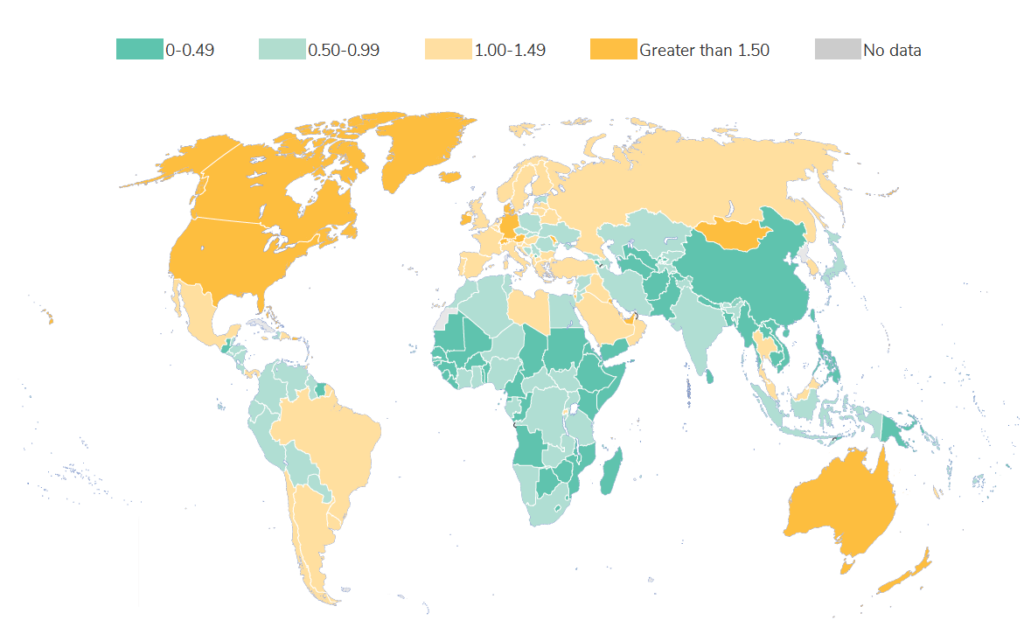Today, most developing/underdeveloped countries are coping with the increasing challenges in wastes management as a result of the trend in industrialization and urbanization leading to global waste trade. For many years now, it has been observed that waste management methods are different in developed countries from that in developing nations. According to the World Bank Group, the global annual waste generated is expected to touch 3.40 billion tons from today’s 2.01 billion tons.

Image:
“Global waste trade or international trade of wastes” between countries has been a subject of dispute as colonization of wastes, for some time now. The term ‘waste colonialism’ (often referred to as toxic colonialism) was first coined in the year 1989 at the United Nations Environmental Programme Basel Convention, when African nations claimed that high GDP countries in Europe and North America were exploiting low GDP countries like Africa as a dumping sink of their domestic wastes generated.
This ‘common’ malpractice gained the world’s attention when developed nations were called out for dumping hazardous wastes upon the low-income countries with little or no regulations and enforcement mechanisms in place. This discovery further led to the adoption of the Basel Convention which focused on the control of transboundary movements of hazardous wastes and their disposal.
Illegal dumping numbers have significantly come down in recent years. The global waste trade currently allows the Global North to export their wastes to the Global South. As such, the European Union is the largest exporter of plastic waste while the USA, among all the countries, is the largest exporter of wastes. Although the import of wastes is a great source of income for developing countries, one cannot disregard the adverse ecological effects due to this unsustainable practice.
The wastes dumped in the Global South consist of contaminated plastic and garbage that cannot be recycled and hence are not treated in a sustainable manner. Furthermore, due to the insufficient resources and lack of technology in many developing countries, these wastes mostly end up piling in landfills or are incinerated in an improper manner. This in turn gives rise to issues such as biodiversity reduction, contamination of soil and groundwater, and release of Landfill gas or LFG (LFG is composed of 50 percent methane, 50 percent carbon dioxide, and a small amount of non-methane organic compounds).
Adding on to the harmful environmental impacts are the adverse health effects. Not only are the local communities exposed to the harmful after effects, but also the workers who deal with wastes for a wage as low as $2-$3 per day, are exposed to the constant risk of falling ill.
In 2017, chaos was seen when China banned the import of 24 types of solid wastes which included plastic waste. China, a former biggest importer of wastes and the largest producer of plastic reported that 70.6% of plastic waste was buried or even mismanaged and therefore gave rise to several environmental problems.
Following this ban, Malaysia replaced China as the largest importer of wastes. Soon the replacement became a subject of debate and the import of plastic waste to South East Asian countries like the Philippines, Indonesia, and Vietnam showed a steep rise.

Image: Export of e-plastics, mixed plastics, etc. from the U.S. to other countries in periods of Jan–Sep 2017 and Jan–Sep 2018
This rise in import of wastes resulted in the adoption of new policies by the South East Asian countries to limit or ban the import of wastes. Thailand, for example, declared an indefinite ban on scrap plastic and electronic imports in 2018.
India followed suit by banning solid plastic waste import in 2019. Similarly, Taiwan declared import of only single-source plastic waste while Vietnam announced their plans on banning all imports of plastic scrap by 2025. Malaysia, on the other hand, successfully shut down 218 illegal plastic recycling factories in the country between 2019 and 2020 and also tightened import permit requirements.
On 1st January 2021, the Basel Convention Plastic Waste Amendments came into effect which further imposed stricter rules on the unsorted plastic waste trade. However, this amendment does not guarantee a solution to the mounting waste issue.
The rising urbanization and changing lifestyles are expected to increase wastes generation tremendously in the near future. Adding on, the demand for more dumping sites (land) continues to be a major challenge that needs to be seriously addressed.

